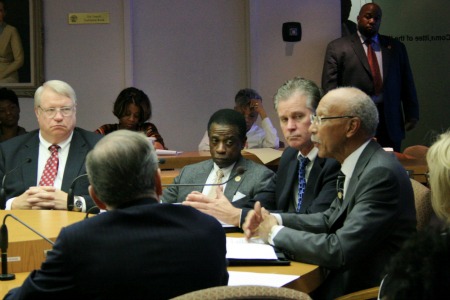
Detroit -Mayor Dave Bing met with the City Council on Monday asking council members to make a “unified effort” to restructure city services and move Detroit out of it’s current fiscal crisis.
Appearing with Bing before the Council was House Speaker Andy Dillon and Sandy Pierce, vice chairwoman of the financial advisory board, the city and state appointed panel set to manage the city’s finances under the State’s emergency manager law, Public Act 4, before it was suspended for a November vote.
The mayor and the council discussed financial reforms suggested by advisory board members including public lighting and safety, legal contracts, city worker compensation, public transit and technology.
“Today I’m asking you to join me in a unified effort to once again make Detroit a great American city,” Bing told the Council.
Council members agreed that reform was needed and seemed amicable with the mayor, despite reported turbulence in the relationship between the Council and the Bing administration.
“You have our support,” Councilman Andre Spivey told Bing regarding the reforms especially the creation of public lighting authority. “I don’t see the Council being an impediment.”
Monday’s meeting marked Bing’s first appearance at a City Council meeting since June, when tensions ran high over a lawsuit brought by the City’s corporation council against the Mayor’s wishes that aimed to halt the consent agreement with the State.
The meeting also comes two weeks after financial advisory board members urged Bing to be more aggressive in carrying out the reforms aimed to keep the city from further financial distress.
“We must make our citizens feel safe,” Bing said at today’s meeting. “We must light up our city and provide local and regional transportation for our citizens.”
Council President Pro-Tem Gary Brown said he supported the reforms but wanted more details, specifically on funding. “My biggest concern is there’s nothing here that we haven’t been tending to during our whole tenure. I’m not sure that these six things are going to generate the money needed,” Brown said.
Bing responded saying the reforms are necessary for the City to be eligible for up to $80 million in bond sales from the State. If reforms are enacted in a timely fashion, Bing said Detroit could receive $10 million by Nov. 15, and another $20 million by Dec. 14 with more installments made as the City meets the reform requirements to boost bond ratings and sales. This money is critical to the City’s ability to pay workers and keep basic city services, he said.
Dillon said Monday’s meeting was encouraging. “I look forward to a new positive direction among all of us,” Dillon told the council and Mayor at the meeting.
Council President Charles Pugh said he appreciated Bing’s gesture to reach out and communicate directly with the council. “I love the new olive branch. We are willing participants in the reforms,” he said.
Bing said the research has been completed and the time has come for action. “It’s about fixing the problems it’s not about studying the problems any more.”
Councilwoman Saunteel Jenkins wanted to know if these reforms could be made without the financial advisory board if the consent agreement falls through on Nov. 6 with a no vote to Proposal 1, the legislation that mandated a financial manger or financial advisory board to rope in Detroit’s spiraling debt.
Bing said it didn’t. “Public Act 4 doesn’t put money in our coffers.”
Pugh said the meeting had been waiting for. “We’ve been were waiting on the Mayor, trying to figure out what’s taking so long,” he told Michronicle.com, adding that some of the reforms discussed are in the legislation process and don’t directly relate to Council decisions. “We’re not a rubber stamp but we’re no obstructionists either.”



